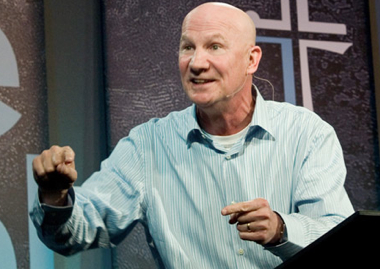I was not surprised when Sovereign Grace Ministries (SGM), the church group I grew up in as a teen and young adult, was served with a lawsuit this past October, alleging clergy cover-ups of sexual abuse.
Sadly, I was even less surprised when the suit was amended in January to include Covenant Life Church (CLC), the congregation I had attended for nine years, and to add new charges of physical and sexual abuse by pastors, as well as allegations of abuse on church property. From what I’d seen inside Sovereign Grace and Covenant Life from 1996–2005, the alleged abuse seemed almost predictable—the result of the group’s toxic teachings on parenting, gender, and sexuality.
Sovereign Grace is a U.S.-based church-planting network (they say “family”) of predominantly white, suburban, reformed evangelical congregations. C.J. Mahaney, the current president, and Larry Tomczak—today a pastor at Bethel World Outreach Church in Brentwood, Tennessee—co-founded the Gaithersburg, Maryland church that would become Covenant Life in 1977. It was the first in what would become a network of 91 churches across 25 states and 17 countries. And it would launch the careers of several conservative Christian activists, including Lou Engle, whose ministry The Call has played a significant role in exporting American religious homophobia to Uganda, as well as Che Ahn, president of the charismatic Harvest International Ministries. Both men were among Covenant Life’s early leaders.
Five years after its founding, in 1982, the church launched what would become its overarching ministry, Sovereign Grace, originally called “People of Destiny International.” The grandiose name reflected the group’s aspirations to greater influence as a ministry, a vision that would only begin to be realized as the group shifted away from its charismatic beginnings toward reformed evangelicalism.
By 1997, Mahaney had found a new protégé in Joshua Harris, a young evangelical beloved in the conservative homeschooling community for his speaking tours and magazine for religious homeschoolers. Harris’ book I Kissed Dating Goodbye, which promoted parent-supervised “courtships” instead of “secular” dating, was published in the same year. Its popularity—the book was a Christian bestseller—and Harris’ name recognition helped bring SGM to greater prominence among evangelicals. Mahaney eventually appointed Harris as his successor as senior pastor of CLC in 2004.
The two men now boast ties with some of the biggest names in reformed evangelicalism, including Albert Mohler, president of the country’s largest Southern Baptist seminary, and Seattle’s “cussing pastor,” Mark Driscoll. Harris and Mahaney are also board members of influential, staunchly conservative organizations like The Gospel Coalition and the Council on Biblical Manhood and Womanhood.
Alongside these powerful partnerships has come strife. In its short history, SGM has been shaken by several high-profile departures and church splits. Co-founder Tomczak left in 1997 over theological disagreements with Mahaney’s increasingly Calvinist-inspired preaching, and his objection to how the church “disciplined” him after one of his sons fell into unspecified “teenage rebellion.”
In July 2011, another former church leader, Brent Detwiler, released documents criticizing his own ouster, recording perceived slights and internal conflicts in painstaking detail, portraying CLC and SGM’s leadership as fractious and dysfunctional and Mahaney as a narcissistic, passive-aggressive bully. It also charged that in 1997, Mahaney had attempted to blackmail Tomczak out of voicing doctrinal disagreements by threatening to reveal his son’s unspecified “sins.”
After Mahaney publicly confessed to this attempted blackmail, and to “deficiencies” in his leadership that seemed to confirm Detwiler’s unflattering account, he was forced to take a leave of absence as president of SGM. But his absence was short-lived; SGM’s board quickly restored him, over the objections of Harris and others, and SGM moved its headquarters to Louisville, Kentucky in April 2012. Since then, several churches have voted to leave SGM, including CLC and Sovereign Grace Church of Fairfax, the other church named in the lawsuit.
The Lawsuit
This rocky history is a fitting prelude to the controversies surrounding the ministry in recent years.
Perhaps the biggest thorn in SGM’s side has been the spate of former members’ blogs that have cropped up since 2007, starting with SGM Survivors—a site where ex-members have shared numerous accounts of SGM’s cult-like atmosphere, including cover-ups of spousal abuse and sexual abuse of children as young as two.
And in October 2012, three people whose stories were first shared on SGM Survivors formalized their complaints by becoming the first plaintiffs in the current class action lawsuit, charging the ministry and its past and present clergy for complicity in the abuse.
The original lawsuit listed SGM, Mahaney, Tomczak, and six other pastors from CLC and Sovereign Grace Church as defendants. The amended filing added five new plaintiffs and CLC, as well as CLC’s day school, the Fairfax church, and two more pastors as defendants. One new plaintiff, “Paula Poe,” alleged that a pastor and church volunteer together operated a “pedophilia ring” at CLC and its school, and that one of their suspected victims, a pastor’s son, went on to molest a seven-year-old boy in the Fairfax church.
The suit has been filed not only on behalf of the individual plaintiffs, but also on behalf of a much larger class of people allegedly abused as minors in SGM, who do not wish to come forward with their stories. The suit alleges that the potential additional victims are too many to be included as individual plaintiffs in the suit because SGM’s leaders have cultivated an “environment conducive to and protective of physical and sexual abuse of children.”
The stories from plaintiffs who are included describe a church culture where pastors’ sympathies routinely lay with male perpetrators of sexual abuse, particulary married fathers, who were allowed continued access to victims and other children in the church. Victims’ families were deliberately misled to keep them out of legal proceedings, while pastors provided perpetrators with legal support. And families were pressured not to report abuse and to “forgive” perpetrators, with even children as young as three being forced to meet their abusers for “reconciliation.”
Women and children who came forward were threatened and ostracized if they resisted efforts to “restore” their abusive husbands and fathers to a position of “leadership” in the family. One plaintiff, “Robin Roe,” whose sister was sexually abused by their adoptive father, reports that their mother was advised by CLC pastors to send the victim away so the abuser could return as “head of the household.” When Roe’s mother refused to submit to this and other pastoral “attempt[s] to obstruct justice,” the family was kicked out of the church.
An anonymous adult witness mentioned in the lawsuit (who originally shared her story as “Taylor” on SGM Survivors) further alleges that church leaders told her her husband had been “tempted” to molest their 10-year-old daughter because Taylor hadn’t “met [her] husband’s needs physically.” Fairfax pastors instructed her to allow her husband to move back into the home and “make sure [she] had physical relations with him regularly,” and to lock their daughter’s bedroom at night.
The abuse allegations include physical as well as sexual abuse. Larry Tomczak, the only defendant explicitly named as a perpetrator in the suit, is alleged to have physically abused “Carla Coe,” a child under his care for over 25 years. (The suit doesn’t specify their relationship, but Tomczak has said that he believes the charges relate to a “family member.”) The abuses are said to include forcing her to undress so Tomczak could beat her “on her bare buttocks”—assaults that allegedly continued well into adulthood. In another account, a plaintiff charges that she and her siblings were sexually abused by their father, and that she had been beaten by him so severely that she bled and bruised. When the siblings reported the abuse to CLC leaders, these pastors informed the father, which they charge “led to further abuse.”
Adding weight to these allegations is the December 2012 indictment of Nathaniel Morales, a CLC children’s ministry volunteer, for sexually abusing four boys between 1985 and 1990. According to media reports, the victim whose account sparked the investigation of Morales alleges that pastors didn’t inform police when the victims’ parents first informed them of the abuse, out of concern for the church’s reputation. Pastors at CLC, including Grant Layman, one of the defendants in the lawsuit, have confirmed that they were aware that Morales had a history of sexual predation.
Another pastor, Ernest Boisvert, says that Morales had shown “contrition” when confronted, and that he “took his cues from [victims’] families” in deciding not to go to the police. These accounts seem to confirm that at least some pastors at CLC were inclined to respond to sexual abuse as “sin” belonging to the jurisdiction of pastors and not necessarily as criminal offenses that required reporting.
A Perfect Storm of Doctrine
It’s no accident that so many allegations of serious abuse have arisen across SGM’s churches. The combination of patriarchal gender roles, purity culture, and authoritarian clergy that characterizes Sovereign Grace’s teachings on parenting, marriage, and sexuality creates an environment where women and children—especially girls—are uniquely vulnerable to abuse.
Critics of evangelical sexual mores have noted the connections between demands for female modesty and chastity and a culture where these same bodies are constantly exposed to sexual violence and abuse. As E.J. Graff put it her analysis of the global implications of the gang rape and murder of Indian medical student Jyoti Singh Pandey, purity culture, whether in India or America, casts “women’s bodies [as]…primarily for procreation or male pleasure… a culture in which women must cover up or be threatened is a rape culture.” [Emphasis mine]
If, as Graff writes, purity culture is rape culture, then the submission culture that exists in many conservative evangelical churches is abuse culture. The level of deference and obedience that children are expected to pay to parents, wives to husbands, and girls and women to an exclusively male leadership is so extreme that it encourages—and sometimes outright demands—submission to men who use their power to abuse.
At Sovereign Grace, abuse culture was literally a part of the teachings. The allegations against CLC co-founder Larry Tomczak bring to mind his bizarrely titled 1982 book God, the Rod, and Your Child’s Bod, a parenting guide that was in heavy use at SGM before his departure. In it, he advises parents to keep multiple instruments for beatings in handy locations so they can “apply loving correction immediately.”
Writing about “disciplining” children who disobey multiple times in a day, Tomczak winkingly describes beatings as “posterior protoplasmic stimulation,” assuring parents that any resulting marks or redness are “nothing to get upset about.” He also recounts giving his 18-month-old son “a series of repeated spankings (with explanation and abundant display of affection between each one)” in a motel parking lot, until the boy “realized that Daddy always wins and wins decisively!” [emphasis his] Tomczak denies physically abusing anyone, but his defense that the current lawsuit’s allegations concern a “disciplinary parental issue” over a “troubled family member” only raises more concerns.
SGM’s teachings on corporal punishment are virtually unchanged since Tomczak’ days as pastor. They continue to promote evangelical parenting manuals like Ted Tripp’s controversial Shepherding a Child’s Heart, which has sparked controversy over its endorsement of spankings for babies as young as eight months old. Application of this teaching can lead to kids being spanked multiple times a day (far more often than I was, as the daughter of very strict immigrant parents, or many other children who grow up in families where corporal punishment is used).
The ultimate goal of discipline, corporal or otherwise, is to instill in children the importance of immediate, complete, and cheerful obedience to authority. Discipline in this context becomes a systematic ritual of physical assault and emotional manipulation. Children are expected to willingly lean over the parent’s knees or a bed, stay still during beatings with a “sturdy but flexible instrument,” not to scream, and not to criticize or express anger towards parents. Parents are to conclude beatings by holding children until they stop crying and apologize, then showing them “lavish affection.” Children must reciprocate this affection and be “peaceful” in order for the ritual to conclude.
A child’s failure to be affectionate and peaceful after a beating is interpreted to mean that they need more discipline. What children learn from these teachings is that corporal punishment is an expression of parental love.
A Lifelong Attitude of Submission
The larger context for corporal punishment is the belief that Christians must cultivate a lifelong attitude of submission to God-given authority. Parents are one such authority; male leadership over women in the family, church, and society is another.
Both women and children are taught that submission is part of a divine plan that should be embraced joyfully, and that even submitting to abusive men is noble and Christ-like. CLC pastor Joshua Harris quotes 1 Peter on this score, praising slaves who obeyed the masters who beat them as following Jesus’ example. Harris interprets this to mean that all Christians are called to submit, even when “suffering” under “unjust” leadership. Therefore wives are called to resist the “sinful” impulse to “fight back” against or even criticize husbands who misuse their “authority.”
These teachings are not unique to SGM. Evangelical leader John Piper—a friend to SGM—has taught that women must maintain attitudes of submission even toward abusive husbands. Wives may, he says, have to,“endure… being smacked one night” if abuse is “simply hurting [them]” and “not requiring [them] to sin” in some way like “group sex.”
It’s such a romanticization of saintly submission in the face of violence that Harris’ exceedingly brief disclaimer that “this isn’t a call [for wives] to be on the receiving end of abuse and violence” (like Piper’s recent clarification of his remarks) comes across as hollow.
If children are taught that assault is divinely sanctioned, and that their bodies belong to adults, girls in particular are trained to see their bodies as male property, starting with their fathers. These lessons come from the top. C.J. Mahaney and his wife Carolyn, herself a popular writer on “biblical femininity,” teach that every piece of clothing girls and married women purchase should be inspected for “modesty” by fathers. And Mahaney encourages his followers to confront girls and women in their congregations whose clothing they find immodest.
Girls grow up under the sexualizing gaze of men who are free to comment on the sexual response female bodies “provoke” in them. This early training in feminine responsibility for the sexual response of men makes it difficult to recognize and name abuse, and causes further trauma with the implication that being a victim of sexual violence makes a woman “impure.”
Beyond Sovereign Grace
The submission theology at the root of the abuses alleged in the lawsuit is not unique to SGM. These teachings have led to similar cases of abuse in entirely unaffiliated churches, and to the proliferation of watchdog blogs like SGM Survivors for similar church groups—including Mark Driscoll’s Mars Hill Church.
At its root, abuse is the harmful exercise of power over others. Submission theology protects the privileges of the powerful; as a result, abuse survivors in submission cultures are not able to fight effectively for support or accountability. It is possible that victim advocacy is inherently impossible in a culture like SGM’s.
Some former Sovereign Grace members hold out hope that exposing these abuses will substantially change the cultures of the church, or at least damage their reputation and influence. Judging from recent scandals in both Catholic and Protestant churches, I’m skeptical.
Indeed, SGM’s own current crisis has so far had little to do with accountability for perpetrators or justice for victims. Rather, it’s the culmination of longstanding power struggles and grudges between the influential men who have led SGM—some of the same men accused of covering up for abusers or being abusers themselves.
What is clear, though, is that the same scrutiny that has been focused on Catholic abuse scandals is needed to understand the factors that contribute to similar scandals in Protestant congregations. The less-centralized nature of many Protestant organizations and the greater difficulty in obtaining data about the scope of sexual abuse in Protestant churches makes this a challenge. But it is important to understand how the theology of such groups can engender cultures of abuse—sexual abuse compounded by religious abuse of authority—and with this understanding, work to create specialized support for victims.





